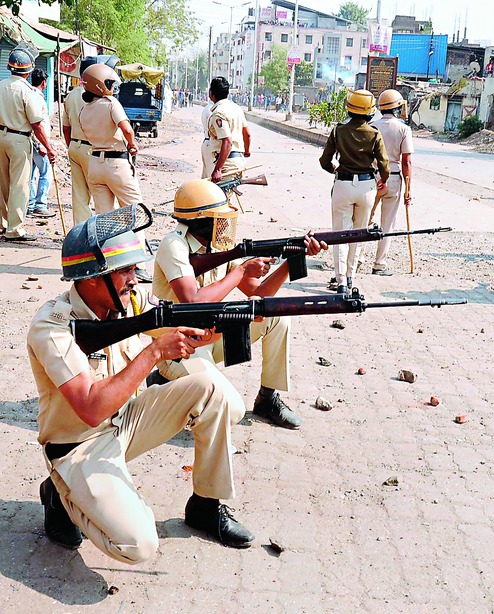


New Delhi: The commemoration of the 200-year-old Battle of Koregaon, which has ignited the caste clashes in Maharashtra since Monday, dates back to 1926.
It was in that year B.R. Ambedkar began to mark the anniversary as a symbol of the victory of the Mahar Dalits over the Peshwas of Pune.
Eight hundred and thirty four mainly Mahar troops of the East India Company had defeated the 28,000-strong Peshwa army in Koregaon Bhima, 28km from Pune, on January 1, 1818.
Under the Peshwa reign, Dalits were allowed to walk on public streets only with brooms tied to their backs and pots tied to their necks - a method to prevent "caste pollution".
Since 1926, the commemoration has become an annual pilgrimage for Ambedkarites despite the removal of the Koregaon Pillar from the Mahar Regiment's crest after Independence.
This time, to mark the 200th anniversary, several Ambedkarite groups held an event called "Elghar Parishad" (declaration council) on December 31 in Pune's Shaniwarwada, the former capital of the Peshwa Brahmin rulers. The event called for an "end to neo-Peshwai".
Gujarat MLA and land rights activist Jignesh Mevani, Jawaharlal Nehru University student Umar Khalid, Hyderabad University Dalit scholar Rohith Vemula's mother Radhika and several others were called to the event.
In his speech, Mevani attacked the RSS, the BJP and some of the most influential industrial groups in the country.
On Tuesday, Mevani tweeted: "The Maharashtra government must ensure rule of law. I appeal to the people of Maharashtra to maintain peace." A rally that Mevani was supposed to address in Mumbai on Wednesday has been cancelled.
Khalid told The Telegraph: "As the mobilisation was much larger this year for the anniversary, Ambedkarite groups gave a platform for all pro-poor voices against Brahminism. In the days leading to the event, several Hindutva groups called for withdrawal of permission and termed the Koregaon commemoration anti-national. However, after Prakash Ambedkar, the grandson of B.R. Ambedkar, held talks with Brahmin leaders, the programme was allowed to continue."
On December 29, upper caste Marathas clashed with Dalits in Vadhu Budruk village near Koregaon over a plaque of Mahar legend Govind Ganapat Gaikwad, who is believed to have performed the last rites of Maratha ruler Sambhaji who was executed by the Mughals in 1689.
Khalid added: "In my talk, I said that past and future struggles draw inspiration from Koregaon Bhima and that 2018 would be challenging as the BJP has failed to fulfil its promise of development and is now resorting to dividing people on communal lines to win elections."
Ambedkar's party, the Bharipa Bahujan Mahasangh, is one of those participating in Wednesday's strike.
Actor-activist Vira Sathidar, known for his role in the award-winning film Court, led a march from Khairlanji in Bhandara, where four Dalits were paraded naked before being murdered by upper caste villagers in 2006, to Koregaon Bhima from December 27 to January 1, this year. He participated in the Elghar Parishad on December 31, as did Chhattisgarh activist Soni Sori.
According to police estimates, 3 lakh people visited Koregaon Bhima on January 1.
Sathidar told this newspaper: "The two possible reasons for the violence we faced are that this year's crowds were bigger than ever and, by holding Elghar Parishad against neo-Peshwai in Shaniwarwada, we have shaken the hold of Brahminical forces."
He added: "All the speakers spoke about how not just Dalits but also Muslims who are lynched, tribals whose land is grabbed, workers who lose their rights to changes in labour laws... are suffering at the hands of neo-Peshwas who have captured power from Delhi to Mumbai."
Surendra Jondhale, a professor in the department of politics and civics, University of Mumbai, said: "In the last two to three years in Maharashtra, there has been a resurgence of anger among Dalit youths because culprits behind atrocities against Dalits go scot-free. Since there is no specific organisation to raise their concerns and grievances and put up a fight, the Dalit youths themselves have become assertive...."
JNU professor Y.S. Alone said: "Ambedkarite followers gathering at Bhima Koregaon is an act to remind themselves to go against the Brahminical structure of oppression. The Brahminical thinking and attitude has conditioned people to act accordingly without using their brains.
"People involved in violence often come from the same stock of communities and they only change their political masters like the Shiv Sena, the BJP and the Congress.... Those involved in violent means are the biggest anti-national and anti-constitutional forces."











